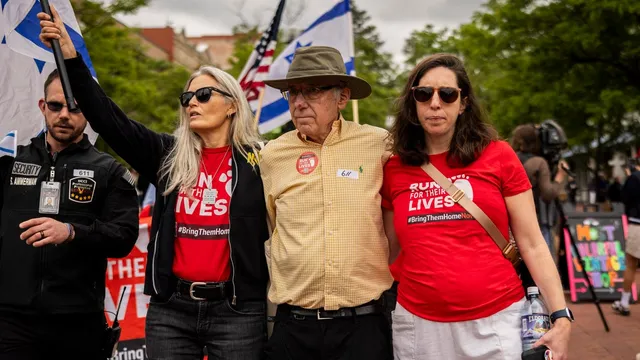
Boulder Jewish Festival sees record attendance amid rising antisemitism
2025-06-09 06:10- The Boulder Jewish Festival took place just one week after an antisemitic attack that injured 15 people.
- Thousands attended the festival, showcasing solidarity and resilience in the Jewish community.
- The event emphasized the importance of celebrating culture and responding to hate with joy and action.
Express your sentiment!
Insights
In the United States, the Boulder Jewish Festival took place on a Sunday, merely one week after a notable antisemitic attack occurred in Boulder. This incident involved a man throwing Molotov cocktails at a group advocating for the release of Israeli hostages in Gaza, resulting in 15 injuries. The FBI categorized this as an act of terror, highlighting the increasing concern within Jewish communities regarding safety and rising antisemitism across the nation. Despite the somber backdrop of community tension and fear, the festival was marked by a vibrant celebration of culture, featuring local artists, traditional foods, and performances. With the participation of thousands along Boulder's Pearl Street Mall, the event was recognized as the largest turnout in the festival's three-decade history. Attendees, including those who traveled long distances, expressed the importance of unity and visibility for the Jewish community during challenging times. The atmosphere combined feelings of concern with a strong sense of solidarity. Many attendees shared their thoughts on the increasing concerns over antisemitic sentiments in society. They remembered those affected by the prior event during a moment of reflection and tributes at the festival, emphasizing the necessity of showing resilience in the face of adversity. Speeches from community leaders further reinforced the themes of unity and compassion. Overall, the Boulder Jewish Festival served not only as a celebration but also as a vital gathering for solidarity, demonstrating a commitment to stand against hate and violence. The turnout reflected a strong community response to the recent attack, emphasizing that individuals did not wish to allow fear to dictate their lives or suppress their identities.
Contexts
Antisemitism in the United States has seen a troubling resurgence in recent years, reflecting broader societal challenges and the rise of various hate groups. This trend is marked by an increase in both violent and non-violent acts of antisemitism, often driven by political rhetoric and the proliferation of misinformation on social media platforms. The Anti-Defamation League (ADL) and other monitoring organizations have reported significant spikes in incidents, including harassment, vandalism, and physical assaults directed at Jewish individuals and properties. Data from the ADL highlights that the number of antisemitic incidents hit a record high in recent years, signaling an urgent need for communities and policymakers to address these issues effectively. One of the factors contributing to the rising antisemitism is the polarization of political discourse in the United States. Far-right extremist groups, in particular, have increasingly adopted antisemitic rhetoric, framing Jews as scapegoats for various societal problems. This sentiment is not confined to fringe elements but has, alarmingly, found its way into mainstream political discussions. Such environments create a fertile ground for antisemitic beliefs to flourish, leading to increased normalization of derogatory stereotypes and conspiracy theories about Jewish individuals. Moreover, the impact of social media cannot be overstated. Platforms like Twitter, Facebook, and Instagram have become conduits for spreading antisemitic content, often with little accountability for individuals or groups disseminating this hate. This digital landscape enables misinformation to proliferate rapidly, reaching a wide audience and influencing public perceptions greatly. The anonymity of the internet allows perpetrators to escape repercussions while empowering them to target Jewish individuals and organizations more freely. Efforts to combat this ugly trend through social media regulation and educational interventions are critical. In response to these alarming developments, various organizations, including Jewish community groups and civil rights advocates, are working to raise awareness and engage in proactive measures to counter antisemitism. This includes educational programs aimed at schools and communities to dispel myths and promote understanding of Jewish culture and history. Additionally, there is a push for stronger legislative measures against hate crimes and increased support for law enforcement agencies to investigate and prosecute antisemitic acts. While there are challenges, the collaborative efforts to confront antisemitism serve as a vital step toward creating a more inclusive society that rejects hate and promotes tolerance.